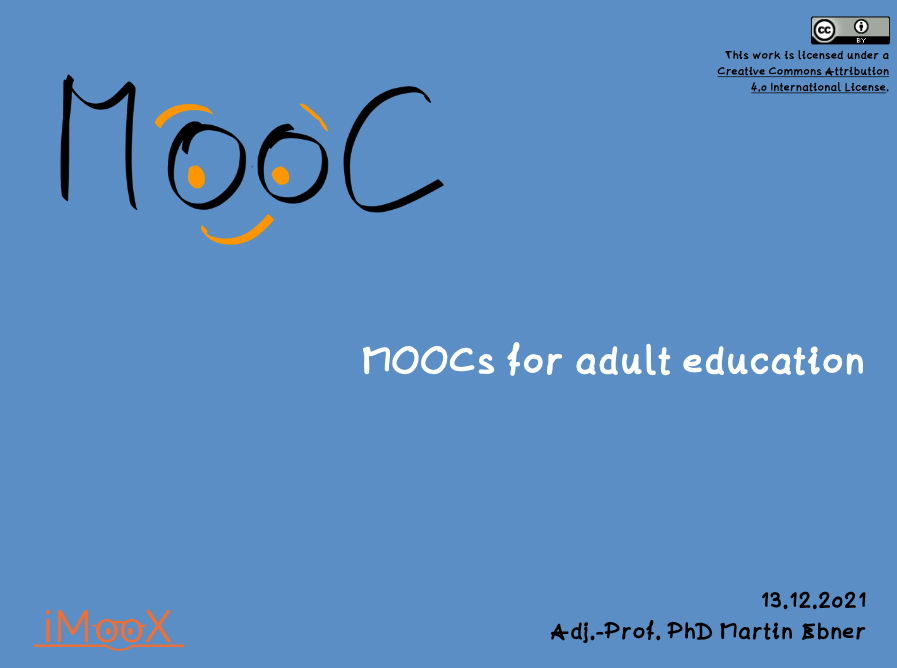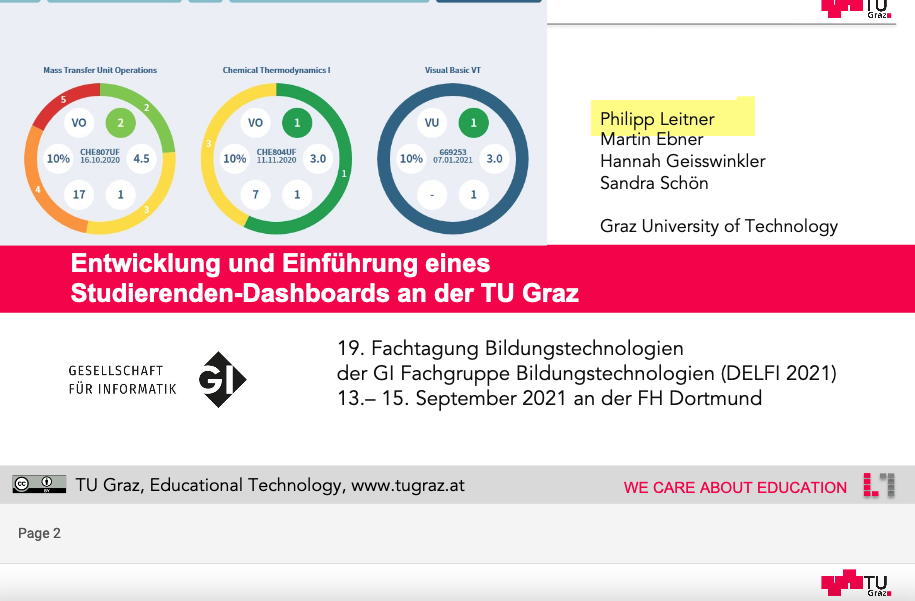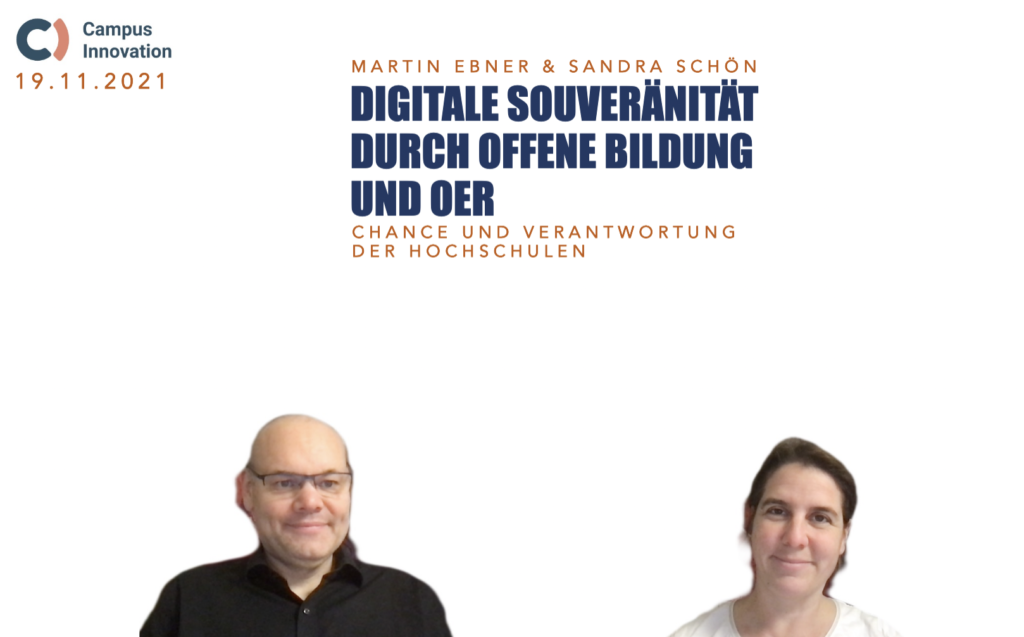I am happy that I can share the slides of my talk about „MOOCs for adult education“for the DISTANCE EDUCATION CONFERENCE on LIFELONG LEARNING last year in Istanbul, Turkey:


Digitale Lehre an und rund um der Technischen Universität Graz
Veröffentlichungen zu jeweiligen Thema
Here are the slides of my keynote talk about „Game based Learning & Gamification in (Higher) Education“ at 2. FHGR Gamification & Serious Games Event in Graubünden (Switzerland):
Im Rahmen der DELFI 2021 haben wir über unsere Entwicklungen rund um eine Studierenden-Dashboard an der TU Graz berichtet. Hier findet man den Foliensatz:

Im Rahmen des Open Education Austria Projektes ist die TU Graz zusammen mit der FNMA verantwortlich ein Konzept für eine Zertifizierung zu entwicklen. Den Stand hierzu haben wir auf der OER-Konferenz jetzt einem internationalen Publikum präsentiert.
Zusammenfassung:
Das Forum Neue Medien in der Lehre Austria (fnma) ist im Rahmen des Projekts «Open Education Austria Advanced» für die Entwicklung und Einführung eines Verfahrens zum Nachweis und Sichtbarmachung von Aktivitäten in Bezug auf offene Bildungsressourcen (Open Educational Resources; kurz OER) verantwortlich. Im Beitrag wird zu OER aus Perspektive österreichischer Hochschulen zu den Hintergründen und Kriterien für die OER-Zertifizierung, bisherigen Entwicklungsarbeiten sowie der Konzeption berichtet.
[Beitrag @ ResearchGate]
[Tagungsband]
Referenz: Schön, Sandra; Ebner, Martin; Brandhofer, Gerhard; Berger, Elfriede; Gröblinger, Ortrun; Jadin, Tanja; Kopp, Michael & Steinbacher, Hans- Peter (2021). OER-Zertifikate für Lehrende und Hochschulen. Kompetenzen und Aktivitäten sichtbar machen. In: Cinzia Gabellini, Sabrina Gallner, Franziska Imboden, Maaike Kuurstra und Peter Tremp (Hrsg.) Lehrentwicklung by Openness – Open Educational Resources im Hochschulkontext, Luzern: Pädagogische Hochschule Luzern, S. 29-32, https://doi.org/10.5281/zenodo.5004445
Helene schrieb ihre Masterarbeit über die Bewältigung der COVID-19-Pandemie an steirische Mittelschulen speziell im Sommersemester 2020. Die wesentlichen Ergebnisse wurden nun zusammengefasst und stehen in einer Publikation nun zu Verfügung:
Zusammenfassung:
Die COVID-19-Krise führte im März 2020 zur Schließung des gesamten österreichischen Schulbetriebs, was zur Folge hatte, dass Präsenzunterricht durch Distance Learning ersetzt werden musste. Der Beitrag stellt die Ergebnisse einer Master-Thesis vor, die das Ziel verfolgte, die technische und organisatorische Umsetzung von Distance Learning während der COVID-19-Krise an den steirischen Mittelschulen im Sommersemester 2019/20 zu untersuchen. An der schriftlichen Befragung nahmen 69 steirische Mittelschulleitungen teil. Der Beitrag beschreibt die schulischen Anordnungen, die Implementierung der Schulinitiativen und das Arrangement der Tools für Lern- und Lehrszenarien. Die Ergebnisse der Befragung zeigen, dass mehr als die Hälfte der steirischen Mittelschulen im Beobachtungszeitraum im Distance Learning keinem extra dafür erstellten Konzept für dessen Durchführung folgten. Videokonferenzen wurden von vielen Schulleitungen angeordnet und E-Mails stellten das beliebteste Kommunikationsmittel dar. Online Lern- und Arbeitsplattformen wurden vermehrt eingesetzt, aber auch auf das Bereitstellen gedruckter Lernmaterialien wurde großer Wert gelegt.
[Artikel @ ResearchGate]
[Artikel @ Journal’s Homepage]
Referenz: Weber, H., Schön, S., Ebner, M. (2021) Distance Learning an steirischen Mittelschulen in Zeiten der COVID-19-Pandemie. In: Online Journal for Research & Education, 16(2021), pp. 1-15 https://doi.org/10.53349/resource.2021.i16.a988
Wir wurden letztes Jahr gefragt ob wir für die Campus Innovation Konferenz 2021 eine Keynote halten wollen, rund um Digitale Souveränität und die Rolle von OER. Als besondere Herausforderung wünscht man sich, dass Sandra und ich dies gemeinsam machen sollen. Wir haben es probiert und hoffen auch, dass es gut angekommen ist – hier gibt es nachträglich noch die Vortragsfolien:

Referenz: Martin Ebner und Sandra Schön (2021). Digitale Souveränität durch offene Bildung und OER. Chance und Verantwortung der Hochschulen.Keynote auf der Campus Innovation 2021, 19.11.2021 [.pdf]
 Issue 17(2) of our journal on emerging technologies for learning got published. Enjoy the readings as usual for free :-).
Issue 17(2) of our journal on emerging technologies for learning got published. Enjoy the readings as usual for free :-).
Table of Contents:
Nevertheless, if you are interested to become a reviewer for the journal, please just contact me 🙂 .
Das Bundesministerium für Bildung, Wissenschaft und Forschung hat eine Studie der Donauuniversität Krems in Zusammenarbeit mit der fnma veröffentlicht. Dabei wurde das Jahr 2020 an österreichischen Hochschulen untersucht:
„Die Studie „Distance Learning an österreichischen Hochschulen im Sommersemester 2020 und Wintersemester 2020/21“ beschreibt die Entwicklung und Situation an österreichischen öffentlichen Universitäten, Fachhochschulen, Privatuniversitäten und Pädagogischen Hochschulen anhand der im April 2021 zugänglichen über 250 Publikationen und Berichten. Die Quellen umfassen dabei neben ersten fachwissenschaftlichen, begutachteten Publikationen auch eine Reihe von Lageberichten, Fallstudien und insbesondere die Ergebnisse von institutionellen Umfragen bei Studierenden und Lehrenden. Die Analyse dieser Quellen erfolgte dabei zu den Begriffen rund um Distance Learning und dessen Qualitätsmerkmalen, zu den internationalen Entwicklungen, zur Ausgangslage an Hochschulen1, zu den Phasen und Entwicklungen während des ersten Jahres der COVID-19-Pandemie, zur technischen Ausstattung, zu Assessment und Prüfungen und zur Situation der Studierenden.“
Auszug aus der Studie (S. 8)
Es gibt vor allem auch konkrete Empfehlungen für die Zukunft im Bereich Distance Learning, daher lohnt es sich sicher die Studie näher zu lesen:
Im Rahmen der OER-Konferenz gab es noch einen weiteren Beitrag von uns zu „Dezentral bereitstellen – zentral finden. Zur Umsetzung hochschulübergreifender OER-Angebote“. Hier beschreiben wir erstmals die technische Komponente des Projekts im Open Education Austria Projekt.
Abstract:
Um OER nutzen zu können, müssen sie gefunden werden. Dieser Beitrag beschreibt eine Lösung für den österreichischen Hochschulraum durch die Zusammenführung von lokalen Hochschul-OER-Repositorien.
[Beitrag @ ReserachGate]
[Konferenzproceeding]
Referenz: Gröblinger, O., Ganguly, R., Hack, C., Ebner, M., Kopp, M. (2021). Dezentral bereitstellen – zentral finden. Zur Umsetzung hochschulübergreifender OER-Angebote. In: Cinzia Gabellini, Sabrina Gallner, Franziska Imboden, Maaike Kuurstra und Peter Tremp (Hrsg.) Lehrentwicklung by Openness – Open Educational Resources im Hochschulkontext, Luzern: Pädagogische Hochschule Luzern, S. 39-44, https://doi.org/10.5281/zenodo.5004445